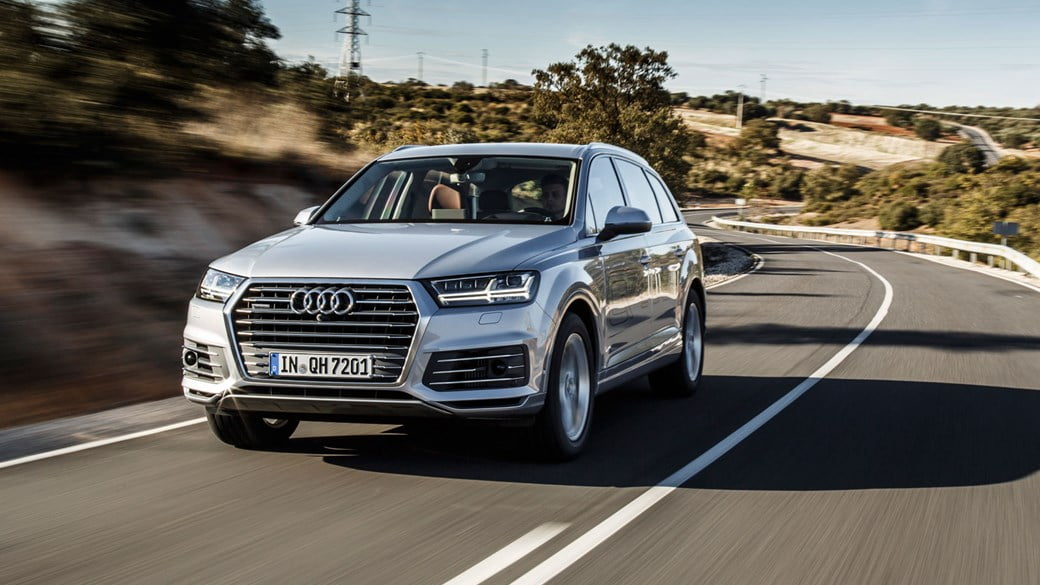
And then there were two. The Q7 e-tron is Audi’s second plug-in hybrid electric vehicle (PHEV) – and in terms of environmental impact it’s not difficult to imagine the Q7 needing more of this kind of assistance than the existingA3 e-tron. Audi’s premier SUV is not a small vehicle. In fact, it’s one of the UK market’s largest 4x4s. Which means adding an electric motor and a massive battery pack might make a bit of sense, even if it also cancels out the final row of seats.
PHEVs seem pretty popular these days…
Yup. See above; when it arrives in Spring 2016, the Q7 e-tron will join four other premium plug-in hybrids fighting to take cash from eco-conscious SUV buyers – with the promise of reduced running costs and a green halo to help offset those therapy bills.
Like the Mercedes GLE500e, Audi has chosen a 3.0-litre V6 turbodiesel to accompany its electric motor, while the rival BMW X5 xDrive40e and Volvo XC90 T8 both use four-cylinder forced-induction petrols. The Cayenne S E-Hybridis madly reliant on a V6 petrol. If you’ve serious eco ambitions you may as well strike the Porsche straight off your list.
So why should I go for the Audi Q7 e-tron over the remaining three?
Even with all the weight Audi’s managed to take out of the second-generation Q7 platform, the e-tron can’t match the nimble, fleet-footed feel of the BMW – nor the raw performance of the (noisy) twin-charged Volvo. At nearly 2.5-tonnes, including 202kg of electronics and batteries hanging out over the back axle, it’s impressive just how safe and assured it actually is, thundering along a mountain road on 20-inch wheels and the optional air suspension. But not even 368bhp, 516lb ft and five-link aluminium suspension can really make the Audi exciting to drive. Quick enough, yes. Exciting, no.
The Q7 gets its own back when it comes to electric range and overall refinement. Audi claims up to 56km (34.8 miles) of electric-only running – and without putting in any particular effort we were able to travel very nearly that distance without troubling the internal combustion engine. It’ll happily stay an EV at motorway speeds, too. When it does kick in, the six-pot is not only smooth but surprisingly sonorous, helped by the world-first application of active engine mounts on a diesel. It’s a much more cultured experience than the gruff Mercedes, which also can’t match the Audi’s interior quality.
I suppose the Q7 e-tron claims crazy fuel economy and CO2 figures, being a plug-in hybrid?
Funnily enough, Audi is quite sensitive to this sort of thing just at the moment, so went out of its way to remind us how the official figures are calculated – which is to say the testing procedure allows the e-tron to start with a fully-charged battery pack. The theory goes that the near 35-mile electric range will be enough to cover many day-to-day journeys on its own. But we still can’t see many people getting anywhere near the provisional 166mpg and 46g/km CO2. We managed an indicated 55mpg, despite using the battery over half the test route.
The Q7 does come with a number of features designed to help you drive it as efficiently as possible. For example, if you’re using the sat-nav, the e-tron will analyse the route and figure out when to best use each hybrid mode – not only automatically engaging electric-only around town but switching to ‘battery save’ or even ‘battery charge’ on the motorway to make sure this facility is available once you get there. Bless.
Trouble is, you have to take its decisions on faith. Seeing that the available electric range would cover the rest of our journey we manually switched over to EV because keeping the diesel running seemed unnecessary, especially when the electric motor’s 258lb ft of instant thrust is generally enough. Audi reckons trusting the machine would have got us closer to 70mpg over the same roads. Hmm.
Any other Little Goody Two-Shoes features on the Q7 e-tron?
Ha! Well, regardless of route planning, there is also the omnipresent green shoe of temperance – an icon that appears in the head-up display to suggest when you should back off in order to anticipate an upcoming reduction in the speed limit or a particularly sharp bend. Part of the Predictive Efficiency Assistant system, this uses the mapping data to foresee the road up to 1.9 miles ahead and works in cahoots with the ‘active accelerator’ pedal.
The active accelerator pulses when the e-tron is convinced you should be slowing down, and also provides a variable point of resistance depending on battery charge state to warn you when you’re approaching the point of diesel activation. It’s pretty subtle, though; we were wearing thin-soled shoes and didn’t notice it. Perhaps we subconsciously just don’t like being told what to do.
Making the most of all that electrical enhancement in other ways, the e-tron is the first PHEV fitted with a heat pump – which scavenges waste heat in order to more efficiently warm the cabin. All-electric vehicle such as the Nissan Leaf and Renault Zoe already use this technology. The Q7 also relies on the (400mm!) conventional brakes as little as possible, using drag from the electric motor to slow itself instead. This process is nicely tuned, with no sign of the inconsistent braking response you get from some hybrid vehicles.
Verdict
The Q7 e-tron is a convincing application of current plug-in hybrid technology, very refined, sleek inside and tidy to drive. But at an expected price of £65,000 – some £12,000 more than the next most expensive Q7 – you’ve got to really want the tech and be in a position to make best use of the electric range in order to seriously consider one as a private buyer. You also have to understand that ‘current’ technology means even a rapid charger needs 2.5 hours to fully replenish the battery, while a domestic supply demands 8 hours, and the discipline to plug it in every night.
[“source-carmagazine”]





